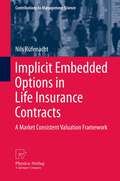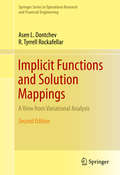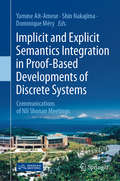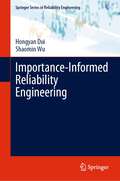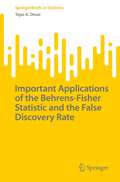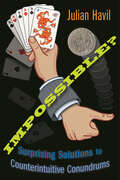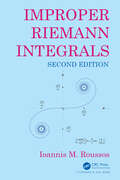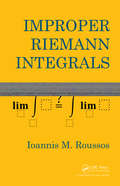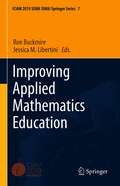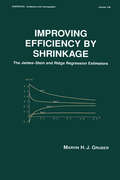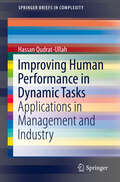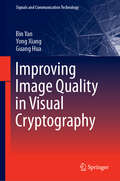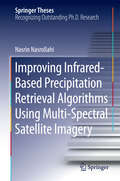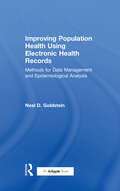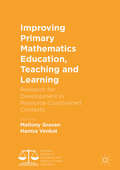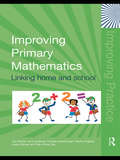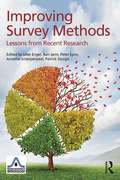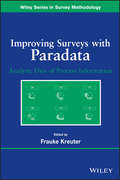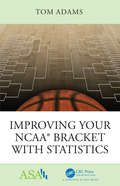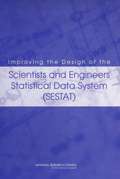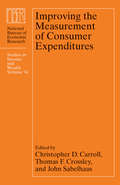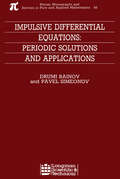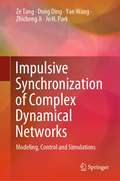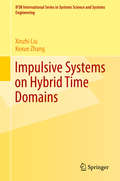- Table View
- List View
Implicit Embedded Options in Life Insurance Contracts: A Market Consistent Valuation Framework
by Nils RüfenachtThis book presents a market-consistent valuation framework for implicit embedded options in life insurance contracts. This framework is used to perform an empirical analysis based on more than 110,000 actual and in-force life insurance policies and with a focus on the modeling of interest rates. Its results are the answer to the central question posed in the objectives: What value do the embedded options and guarantees considered have? This question is answered both absolutely and relative to the current policy reserves, from the perspective of the insurer, the policyholder and the shareholder respectively
Implicit Functions and Solution Mappings
by R. Tyrrell Rockafellar Assen L. DontchevThe implicit function theorem is one of the most important theorems in analysis and its many variants are basic tools in partial differential equations and numerical analysis. This book treats the implicit function paradigm in the classical framework and beyond, focusing largely on properties of solution mappings of variational problems. The purpose of this self-contained work is to provide a reference on the topic and to provide a unified collection of a number of results which are currently scattered throughout the literature. The first chapter of the book treats the classical implicit function theorem in a way that will be useful for students and teachers of undergraduate calculus. The remaining part becomes gradually more advanced, and considers implicit mappings defined by relations other than equations, e.g., variational problems. Applications to numerical analysis and optimization are also provided. This valuable book is a major achievement and is sure to become a standard reference on the topic.
Implicit and Explicit Semantics Integration in Proof-Based Developments of Discrete Systems: Communications of NII Shonan Meetings
by Shin Nakajima Dominique Méry Yamine Ait-AmeurThis book addresses mechanisms for reducing model heterogeneity induced by the absence of explicit semantics expression in the formal techniques used to specify design models. More precisely, it highlights the advances in handling both implicit and explicit semantics in formal system developments, and discusses different contributions expressing different views and perceptions on the implicit and explicit semantics. The book is based on the discussions at the Shonan meeting on this topic held in 2016, and includes contributions from the participants summarising their perspectives on the problem and offering solutions. Divided into 5 parts: domain modelling, knowledge-based modelling, proof-based modelling, assurance cases, and refinement-based modelling, and offers inspiration for researchers and practitioners in the fields of formal methods, system and software engineering, domain knowledge modelling, requirement analysis, and explicit and implicit semantics of modelling languages.
Importance-Informed Reliability Engineering (Springer Series in Reliability Engineering)
by Hongyan Dui Shaomin WuThis book provides university students and practitioners with a collection of importance measures to design systems with high reliability, maintain them with high availability, and restore them in case of failures. Optimal reliability design, properly system maintenance and resilience management are vital for retaining a high level of system availability. Reliability importance measures, which are used to identify the weakest components from different perspectives, can be used to achieve this goal. The book has seven parts. Chapter 1 introduces the basic concepts. Chapter 2 focuses on importance measures for the system design phase and introduces how the system reliability can be improved with importance measures. Chapters 3 and 4 provide importance measures-related methods for scheduling maintenance policies under different scenarios. Chapter 5 provides importance measures for networks. Chapter 6 proposes importance measures for resilience management. The last chapter, or Chapter 7, illustrates the importance measures with case studies adopted from four types of systems: mechanical systems, energy systems, transport networks, and supply chain networks.
Important Applications of the Behrens-Fisher Statistic and the False Discovery Rate (SpringerBriefs in Statistics)
by Tejas A. DesaiThis book discusses important applications of the Behrens-Fisher statistic and the False Discovery Rate (FDR). Covered applications include ANOVA and MANOVA under potentially non-normal errors and heteroscedasticity; and an intuitive method of analyzing s x r contingency tables when the column variable is ordinal. This book also explores the novel possibility that these applications may be deemed nonparametric.
Impossible?: Surprising Solutions to Counterintuitive Conundrums
by Julian HavilIn Nonplussed!, popular-math writer Julian Havil delighted readers with a mind-boggling array of implausible yet true mathematical paradoxes. Now Havil is back with Impossible?, another marvelous medley of the utterly confusing, profound, and unbelievable—and all of it mathematically irrefutable.Whenever Forty-second Street in New York is temporarily closed, traffic doesn't gridlock but flows more smoothly—why is that? Or consider that cities that build new roads can experience dramatic increases in traffic congestion—how is this possible? What does the game show Let's Make A Deal reveal about the unexpected hazards of decision-making? What can the game of cricket teach us about the surprising behavior of the law of averages? These are some of the counterintuitive mathematical occurrences that readers encounter in Impossible?Havil ventures further than ever into territory where intuition can lead one astray. He gathers entertaining problems from probability and statistics along with an eclectic variety of conundrums and puzzlers from other areas of mathematics, including classics of abstract math like the Banach-Tarski paradox. These problems range in difficulty from easy to highly challenging, yet they can be tackled by anyone with a background in calculus. And the fascinating history and personalities associated with many of the problems are included with their mathematical proofs. Impossible? will delight anyone who wants to have their reason thoroughly confounded in the most astonishing and unpredictable ways.
Improper Riemann Integrals
by Ioannis Markos RoussosThe scope of this book is the improper or generalized Riemann integral and infinite sum (series). The reader will study its convergence, principal value, evaluation and application to science and engineering. Improper Riemann integrals and infinite sums are interconnected. In the new edition, the author has involved infinite sums more than he did in the first edition. Apart from having computed and listed a large number of improper integrals and infinite sums, we have also developed the necessary theory and various ways of evaluating them or proving their divergence. Questions, problems and applications involving various improper integrals and infinite sums (series) of numbers emerge in science and application very often. Their complete presentations and all rigorous proofs would require taking the graduate-level courses on these subjects. Here their statements are adjusted to a level students of all levels can understand and use them efficiently as powerful tools in a large list of problems and applications.
Improper Riemann Integrals
by Ioannis RoussosImproper Riemann Integrals is the first book to collect classical and modern material on the subject for undergraduate students. The book gives students the prerequisites and tools to understand the convergence, principal value, and evaluation of the improper/generalized Riemann integral. It also illustrates applications to science and engineering
Improving Applied Mathematics Education (SEMA SIMAI Springer Series #7)
by Ron Buckmire Jessica M. LibertiniThis book presents various contemporary topics in applied mathematics education and addresses both interested undergraduate instructors and STEM education researchers. The diverse set of topics of this edited volume range from analyzing the demographics of the United States mathematics community, discussing the teaching of calculus using modern tools, engaging students to use applied mathematics to learn about and solve problems of global significance, developing a general education course for humanities and social sciences students that features applications of mathematics, and describing local mathematical modeling competitions and their use in providing authentic experiences for students in applying mathematics to real world situations. The authors represent diversity along multiple dimensions of difference: race, gender, institutional affiliation, and professional experience.
Improving Efficiency by Shrinkage: The James--Stein and Ridge Regression Estimators (Statistics: A Series Of Textbooks And Monographs #156)
by Marvin GruberOffers a treatment of different kinds of James-Stein and ridge regression estimators from a frequentist and Bayesian point of view. The book explains and compares estimators analytically as well as numerically and includes Mathematica and Maple programs used in numerical comparison.;College or university bookshops may order five or more copies at a special student rate, available on request.
Improving Human Performance in Dynamic Tasks: Applications in Management and Industry (SpringerBriefs in Complexity)
by Hassan Qudrat-UllahThis book is about improving human decision making and performance in complex, dynamic tasks. The defining characteristics of a dynamic decision task are that there are a number of decisions required, that decisions are interdependent and that the environment in which the decision is made is transient and feedback is pervasive. Examples of dynamic tasks include the sustainable management of renewable resources and how businesses might allocate resources for research and development (R&D) projects. Decision making in dynamic tasks can be improved through training with system dynamics–based interactive learning environments (ILE’s) that include systematic debriefing. Some key features of the book include its didactic approach, numerous tables, figures, and the multidimensional evaluative model. Researchers can use the developed “evaluation model” to gauge various decision-aiding technologies. How to Improve Human Performance in Dynamic Tasks appeals to those interested in the design and evaluation of simulation-based decision support systems, as well as policy makers, students, researchers, and industrialists concerned by the issue of improving human performance in organizational tasks.
Improving Image Quality in Visual Cryptography (Signals and Communication Technology)
by Yong Xiang Guang Hua Bin YanThis book comprehensively covers the important efforts in improving the quality of images in visual cryptography (VC), with a focus on cases with gray scale images. It not only covers schemes in traditional VC and extended VC for binary secret images, but also the latest development in the analysis-by-synthesis approach. This book distinguishes itself from the existing literature in three ways. First, it not only reviews traditional VC for binary secret images, but also covers recent efforts in improving visual quality for gray scale secret images. Second, not only traditional quality measures are reviewed, but also measures that were not used for measuring perceptual quality of decrypted secret images, such as Radially Averaged Power Spectrum Density (RAPSD) and residual variance, are employed for evaluating and guiding the design of VC algorithms. Third, unlike most VC books following a mathematical formal style, this book tries to make a balance between engineering intuition and mathematical reasoning. All the targeted problems and corresponding solutions are fully motivated by practical applications and evaluated by experimental tests, while important security issues are presented as mathematical proof. Furthermore, important algorithms are summarized as pseudocodes, thus enabling the readers to reproduce the results in the book. Therefore, this book serves as a tutorial for readers with an engineering background as well as for experts in related areas to understand the basics and research frontiers in visual cryptography.
Improving Infrared-Based Precipitation Retrieval Algorithms Using Multi-Spectral Satellite Imagery
by Nasrin NasrollahiThis thesis transforms satellite precipitation estimation through the integration of a multi-sensor, multi-channel approach to current precipitation estimation algorithms, and provides more accurate readings of precipitation data from space. Using satellite data to estimate precipitation from space overcomes the limitation of ground-based observations in terms of availability over remote areas and oceans as well as spatial coverage. However, the accuracy of satellite-based estimates still need to be improved. The approach introduced in this thesis takes advantage of the recent NASA satellites in observing clouds and precipitation. In addition, machine-learning techniques are also employed to make the best use of remotely-sensed "big data. " The results provide a significant improvement in detecting non-precipitating areas and reducing false identification of precipitation.
Improving Population Health Using Electronic Health Records: Methods for Data Management and Epidemiological Analysis
by Neal D. GoldsteinElectronic health records (EHRs) have become commonplace in the medical profession. Health data are readily captured and permanently stored in a digital fashion, and consequently, are increasingly being utilized in health research. The quality of this research depends upon the investigator’s ability to obtain the correct data to answer the correct question. It is easy to churn out poor quality research from the EHR; it is much harder to produce meaningful results that influence the population’s health. Improving Population Health Using Electronic Health Records takes the reader through the process of conducting meaningful research from data in the EHR. It de-mystifies the entire research process, from how to ask the right kind of research questions, to obtaining data with particular emphasis on data management and manipulation, to performing a valid statistical analyses, and interpreting and presenting the results in a clear, concise fashion that has the potential to improve population health. This book can be used as a hands-on how-to guide of performing research from EHR data in either a piece-meal fashion, selecting only the topics of greatest interest, or a complete guide to the entire research process. Readers will benefit from the intuitive presentation of complex methods with a multitude of examples. It is invaluable reading for researchers and clinicians who are not otherwise familiar with the complexities of working with large data sets.
Improving Primary Mathematics Education, Teaching and Learning
by Mellony Graven Hamsa VenkatThis book focuses on how to improve the teaching and learning of primary level mathematics education within resource-constrained contexts. It builds on two large numeracy projects within South Africa which speak to broader, global concerns and highlight how research and development not only enables one to meet ethical imperatives but also explore how further interventions can be developed. Teacher and research communities must work together to create mutually beneficial relationships and establish a cohesive understanding of the requirements of primary mathematics education.
Improving Primary Mathematics: Linking Home and School (Improving Practice (TLRP))
by Jan Winter Martin Hughes Jane Andrews Pamela Greenhough Leida Salway Wan Ching YeeImproving Primary Mathematics provides primary teachers with practical ideas about how to bring these two worlds closer to improve children’s mathematics learning. Using a number of fascinating case studies focusing on children’s experiences of mathematics both inside and outside the classroom, the book asks: How do children use mathematics in their everyday lives? How can teachers use this knowledge to improve children’s learning in school? What activities can teachers use with parents to help share the ways that schools teach mathematics? What can parents do to support their children’s learning of mathematics? Tried-and-tested practical suggestions for activities to support and encourage children’s learning of mathematics include: making videos to share teaching methods; children taking photos to show how they use mathematics at home; inviting parents into school to share in mathematics learning; and numeracy-based activities for children and their parents to do together at home. All those involved in planning, teaching and supporting primary mathematics will benefit from new insights into how learning at home and at school can be brought together to strengthen and improve children’s learning of mathematics.
Improving Survey Methods: Lessons from Recent Research (European Association of Methodology Series)
by Uwe Engel Ben Jann Peter Lynn Annette Scherpenzeel Patrick SturgisThis state-of-the-art volume provides insight into the recent developments in survey research. It covers topics like: survey modes and response effects, bio indicators and paradata, interviewer and survey error, mixed-mode panels, sensitive questions, conducting web surveys and access panels, coping with non-response, and handling missing data. The authors are leading scientists in the field, and discuss the latest methods and challenges with respect to these topics. Each of the book’s eight parts starts with a brief chapter that provides an historical context along with an overview of today’s most critical survey methods. Chapters in the sections focus on research applications in practice and discuss results from field studies. As such, the book will help researchers design surveys according to today’s best practices. The book’s website www.survey-methodology.de provides additional information, statistical analyses, tables and figures. An indispensable reference for practicing researchers and methodologists or any professional who uses surveys in their work, this book also serves as a supplement for graduate or upper level-undergraduate courses on survey methods taught in psychology, sociology, education, economics, and business. Although the book focuses on European findings, all of the research is discussed with reference to the entire survey-methodology area, including the US. As such, the insights in this book will apply to surveys conducted around the world.
Improving Surveys with Paradata
by Frauke KreuterExplore the practices and cutting-edge research on the new and exciting topic of paradataParadata are measurements related to the process of collecting survey data.Improving Surveys with Paradata: Analytic Uses of Process Information is the most accessible and comprehensive contribution to this up-and-coming area in survey methodology.Featuring contributions from leading experts in the field, Improving Surveys with Paradata: Analytic Uses of Process Information introduces and reviews issues involved in the collection and analysis of paradata. The book presents readers with an overview of the indispensable techniques and new, innovative research on improving survey quality and total survey error. Along with several case studies, topics include:Using paradata to monitor fieldwork activity in face-to-face, telephone, and web surveysGuiding intervention decisions during data collectionAnalysis of measurement, nonresponse, and coverage error via paradataProviding a practical, encompassing guide to the subject of paradata, the book is aimed at both producers and users of survey data. Improving Surveys with Paradata: Analytic Uses of Process The book also serves as an excellent resource for courses on data collection, survey methodology, and nonresponse and measurement error.
Improving Your NCAA® Bracket with Statistics (ASA-CRC Series on Statistical Reasoning in Science and Society)
by Tom AdamsTwenty-four million people wager nearly $3 billion on college basketball pools each year, but few are aware that winning strategies have been developed by researchers at Harvard, Yale, and other universities over the past two decades. Bad advice from media sources and even our own psychological inclinations are often a bigger obstacle to winning than our pool opponents. Profit opportunities are missed and most brackets submitted to pools don’t have a breakeven chance to win money before the tournament begins. Improving Your NCAA® Bracket with Statistics is both an easy-to-use tip sheet to improve your winning odds and an intellectual history of how statistical reasoning has been applied to the bracket pool using standard and innovative methods. It covers bracket improvement methods ranging from those that require only the information in the seeded bracket to sophisticated estimation techniques available via online simulations. Included are: Prominently displayed bracket improvement tips based on the published research A history of the origins of the bracket pool A history of bracket improvement methods and their results in play Historical sketches and background information on the mathematical and statistical methods that have been used in bracket analysis A source list of good bracket pool advice available each year that seeks to be comprehensive Warnings about common bad advice that will hurt your chances Tom Adams’ work presenting bracket improvement methods has been featured in the New York Times, Sports Illustrated, and SmartMoney magazine.
Improving the Design of the Scientists and Engineers Statistical Data System (SESTAT)
by National Research CouncilInformation on Improving the Design of the Scientists and Engineers Statistical Data System
Improving the Measurement of Consumer Expenditures
by Thomas F. Crossley John Sabelhaus Christopher D. CarrollRobust and reliable measures of consumer expenditures are essential for analyzing aggregate economic activity and for measuring differences in household circumstances. Many countries, including the United States, are embarking on ambitious projects to redesign surveys of consumer expenditures, with the goal of better capturing economic heterogeneity. This is an appropriate time to examine the way consumer expenditures are currently measured, and the challenges and opportunities that alternative approaches might present. Improving the Measurement of Consumer Expenditures begins with a comprehensive review of current methodologies for collecting consumer expenditure data. Subsequent chapters highlight the range of different objectives that expenditure surveys may satisfy, compare the data available from consumer expenditure surveys with that available from other sources, and describe how the United States's current survey practices compare with those in other nations.
Improving the Measurement of Late-Life Disability in Population Surveys: Beyond ADLs and IADLs - Summary of a Workshop
by National Research Council of the National AcademiesImproving the Measurement of Late-Life Disability in Population Surveys summarizes a workshop organized to draw upon recent advances to improve the measurement of physical and cognitive disability in population surveys of the elderly population. The book questions whether or not the measures of activities of daily living and instrumental activities of daily living used in many population surveys are sufficient as the primary survey-based indicators of late-life disability. If not, should they be refined or should they be supplemented by other measures of disability in surveys? If yes, in what ways should disability measures be changed or modified to produce population estimates of late-life disability and to monitor trends? The book also discusses what further research is needed to advance this effort.
Impulsive Differential Equations: Periodic Solutions and Applications (Monographs And Surveys In Pure And Applied Mathematics Ser. #66)
by Drumi Bainov Pavel SimeonovImpulsive differential equations have been the subject of intense investigation in the last 10-20 years, due to the wide possibilities for their application in numerous fields of science and technology. This new work presents a systematic exposition of the results solving all of the more important problems in this field.
Impulsive Synchronization of Complex Dynamical Networks: Modeling, Control and Simulations
by Yan Wang Ju H. Park Ze Tang Dong Ding Zhicheng JiThis book is mainly focused on the global impulsive synchronization of complex dynamical networks with different types of couplings, such as general state coupling, nonlinear state coupling, time-varying delay coupling, derivative state coupling, proportional delay coupling and distributed delay coupling. Studies on impulsive synchronization of complex dynamical networks have attracted engineers and scientists from various disciplines, such as electrical engineering, mechanical engineering, mathematics, network science, system engineering. Pursuing a holistic approach, the book establishes a fundamental framework for this topic, while emphasizing the importance of network synchronization and the significant influence of impulsive control in the design and optimization of complex networks. The primary audience for the book would be the scholars and graduate students whose research topics including the network science, control theory, applied mathematics, system science and so on.
Impulsive Systems on Hybrid Time Domains (IFSR International Series in Systems Science and Systems Engineering #33)
by Xinzhi Liu Kexue ZhangThis monograph discusses the issues of stability and the control of impulsive systems on hybrid time domains, with systems presented on discrete-time domains, continuous-time domains, and hybrid-time domains (time scales). Research on impulsive systems has recently attracted increased interest around the globe, and significant progress has been made in the theory and application of these systems. This book introduces recent developments in impulsive systems and fundamentals of various types of differential and difference equations. It also covers studies in stability related to time delays and other various control applications on the different impulsive systems. In addition to the analyses presented on dynamical systems that are with or without delays or impulses, this book concludes with possible future directions pertaining to this research.
